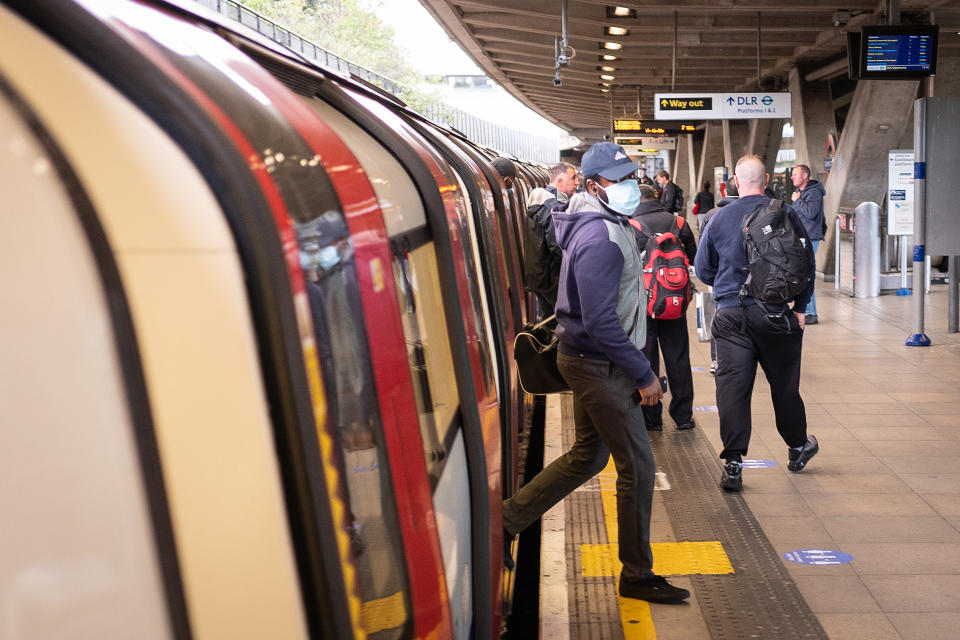Coronavirus: Police have 'no powers' to enforce two-metre social distancing in England

Police in England have been told they have “no powers” to enforce two-metre social distancing.
People are now able to stay outside for an unlimited amount of time after new coronavirus lockdown rules came into force on Wednesday, and some workers have also been told they can go back to their jobs.
But new guidelines issued by the College of Policing and the National Police Chiefs’ Council urge officers to only enforce what is written in law.
They say “government guidance is not enforceable, for example two-metre distancing, avoiding public transport or the wearing of face coverings in enclosed spaces”.
The advice is set out in a document that was published on Wednesday after being sent out to forces on Tuesday night.
Read more: Unions threaten to stop trains if services become too busy
Neither the original Health Protection (Coronavirus, Restrictions) (England) Regulations 2020 from 26 March nor Wednesday’s amendment address social distancing specifically, so keeping two metres (6ft) apart in certain circumstances is not a legal requirement.
Met Commissioner Cressida Dick admitted the updated lockdown rules would make it “slightly more complicated” for officers but said there had been “incredibly high levels of compliance” and that fines for disobeying rules were “very rare”.
Despite the UK government’s preference for a “four nations approach” towards softening the lockdown, clear differences have emerged between the countries.
Latest coronavirus news, updates and advice
Live: Follow all the latest updates from the UK and around the world
Fact-checker: The number of COVID-19 cases in your local area
6 charts and maps that explain how coronavirus is spreading
The devolved governments in Northern Ireland, Scotland and Wales have diverged from England, notably in keeping the “stay at home” message after Boris Johnson unveiled his new “stay alert” slogan on Sunday.
Scotland’s first minister Nicola Sturgeon has kept all existing lockdown measures for at least another three weeks, but eased “one small aspect”, allowing socially distanced walking and exercising outdoors more than once per day.
On Tuesday the Northern Ireland Executive published a five-step road map to relax lockdown measures – but with no firm dates.
The Welsh government has committed to another three weeks of lockdown.
Read more: Reopening of schools 'unlikely to cause huge problems', disease expert says

The new rules in England allow people to leave their house more often but they still need a good reason to do so.
Good reasons include to take exercise, to buy food and medical supplies, to go to a funeral in some cases, to attend court and take part in legal proceedings, and to “escape a risk of harm”.
Additionally, the new law makes clear people can now “collect goods ordered” from businesses that have been allowed to stay open, albeit with restrictions, and go to waste or recycling centres.
Read more: Back-to-work Brits fill some buses and Tube trains
People will be allowed to take unlimited amounts of outdoor exercise, sit in the sun in a local park, drive to other destinations, and play sports such as golf, tennis or angling, but only with members of their household.
Johnson said on Sunday that those who can work from home should continue to do so but anyone who cannot, such as those working in construction and manufacturing, “should be actively encouraged to go to work”.
The requirement for buses, trains and underground rail services to maintain social distancing rules means they will only be able to carry vastly reduced passenger numbers, with public transport capacity expected to drop by around 90%.
Johnson urged those returning to commuting to consider cycling, walking or driving to work instead.
Coronavirus: what happened today?
Click here to sign up to the latest news, advice and information with our daily Catch-up newsletter

 Yahoo News
Yahoo News 
